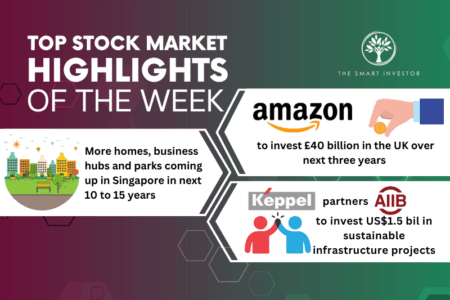The date was 3 November 2022.
Shares of Meta Platforms (NASDAQ: META), the parent company of Facebook, had plunged below US$90.
By then, shares were down by a gut-wrenching 77% from their 2021 peak.
The stock price had gone nowhere for seven years, critics of long-term investing pointed out.
Furthermore, if shares are down by THAT much, you have clearly overpaid for them. If you were any good at valuing the stock, you would have sold out earlier, the critics pile on.
Above all, you have definitely made a mistake in buying Meta shares …
… but DID you?
Today, Meta shares trade at close to US$512 per share, up over 475% from their low on 3 November 2022.
Even if you had the great misfortune of buying at its 2021 peak, you would still be up by over 34%. For the maths geeks out there, that’s still a 12% per year gain, better than the long-term average of the US stock market of 10% per year.
Not bad for an “unlucky” investor.
Sir, it’s the business, not the stock price
It’s not surprising to see investors react negatively to major stock price declines.
When your money’s at stake in the stock, you can’t help but search for reasons, as the example of Meta has shown.
We understand.
To be fair, Meta was dealing with plenty of problems:
- In February 2022, Facebook reported a loss of a million daily active users (DAUs) compared to its previous quarter.
- In addition, the company singled out TikTok as a threat, saying that TikTok was one of the most formidable opponents it has faced.
- Furthermore, Meta was starting to feel the strain from Apple’s (NASDAQ: AAPL) new AppTrackingTransparency (ATT) framework. The new structure severely cut Meta’s ability to target users accurately, a key value proposition of the social media platform’s ads.
- To top it off, Meta was dead set on increasing its spending on everything from artificial intelligence to the metaverse. The firm’s free cash flow (FCF) took a hit shortly after.
The situation looked bleak.
Predictably, news outlets went to town on Facebook’s problems, almost delighting in its stumbles.
The social network was described as a “big loser in the ad wars” and was facing a “perfect storm of fleeing users and privacy changes”.
Strangely, these same media outlets have gone quiet now.
My guess is that they are at a loss for words for the 181 million DAUs that Facebook has gained since it reported a loss of a million DAUs — the cheers, in this case, are far less eager than the boos.
Unfortunately, this behaviour is to be expected.
Media companies are interested in how much traffic they can get from each article. And it’s far easier to sell bad news than it is to sell good news.
The lesson here?
When the chips are down, it’s far easier to be a pessimist than it is to be an optimist. In a world which is all too eager to tell you everything that’s gone wrong, look for the positives amid the chorus of boos.
So, when shares of Meta were down, we decided to dig for good news.
The optimist’s triumph
Throughout 2022, we kept following Meta’s developments even as share prices fell.
Now, in case you thought this was an act of blind faith — it’s not.
Meta is not a new company to me as I have owned its shares since 2016, more than eight years ago. I count myself fortunate to have witnessed such scenarios play out in the stock market over and over again.
This is not Meta’s first rodeo.
Bit by bit, the good news turned up with far less media fanfare.
In place of the loss of revenue due to Apple’s ATT, Meta created THREE new revenue streams with over US$10 billion in annualised sales, including from Reels, Meta’s short-form video product created in response to TikTok.
Revenue started to rise again, buoyed by an improving ad market.
By the end of 2023, FCF per share was up 22% compared to 2021. In other words, the stock price reflected the improvement in the business.
Therein lies another lesson.
If you are facing heartburn from a fallen stock price, your best bet is to look at the business for clues.
As Warren Buffett once said, games are won by players who focus on the playing field (in this case, the business) — not by those whose eyes are glued to the scoreboard (the stock price).
After all, as the example above shows, if a business does well, its performance will eventually turn up in its share price.
Get Smart: The Gift that Keeps Giving
Some might say that stories of past stock gains are meaningless.
Sure, if you are an early investor, you have recorded a tidy profit but the days of runaway growth are surely over.
That’s not always true.
By the time I came around to buying shares of Meta, the stock price was already up more than 150% from its initial public offering (IPO) price.
Okay, that’s great — but what about something more recent?
Our US growth stock-focused service, The Smart All Stars Portfolio bought Meta shares in January 2022, and again in February 2022, a decade after its IPO. Here’s an important note: the portfolio didn’t even come close to getting the lowest stock price available.
Yet, those shares are up by over 58% and 153%, respectively.
It’s not the best returns you could have gotten, of course, but I have yet to see a sad investor with such returns.
Again, the key difference is not how late or how early you buy a stock.
Instead, the main determinant was whether its underlying business had continued growing.
Attention Growth Investors: Our latest report, “The Rise of Titans,” gives you a front-row seat on the 7 most influential US stocks today. If you’re passionate about tech and growth, you can’t go wrong with our research. Downloading this FREE report could be the most strategic move you make this year. Click here to get started now.
Follow us on Facebook and Telegram for the latest investing news and analyses!
Disclosure: Chin Hui Leong owns shares of Apple and Meta.





